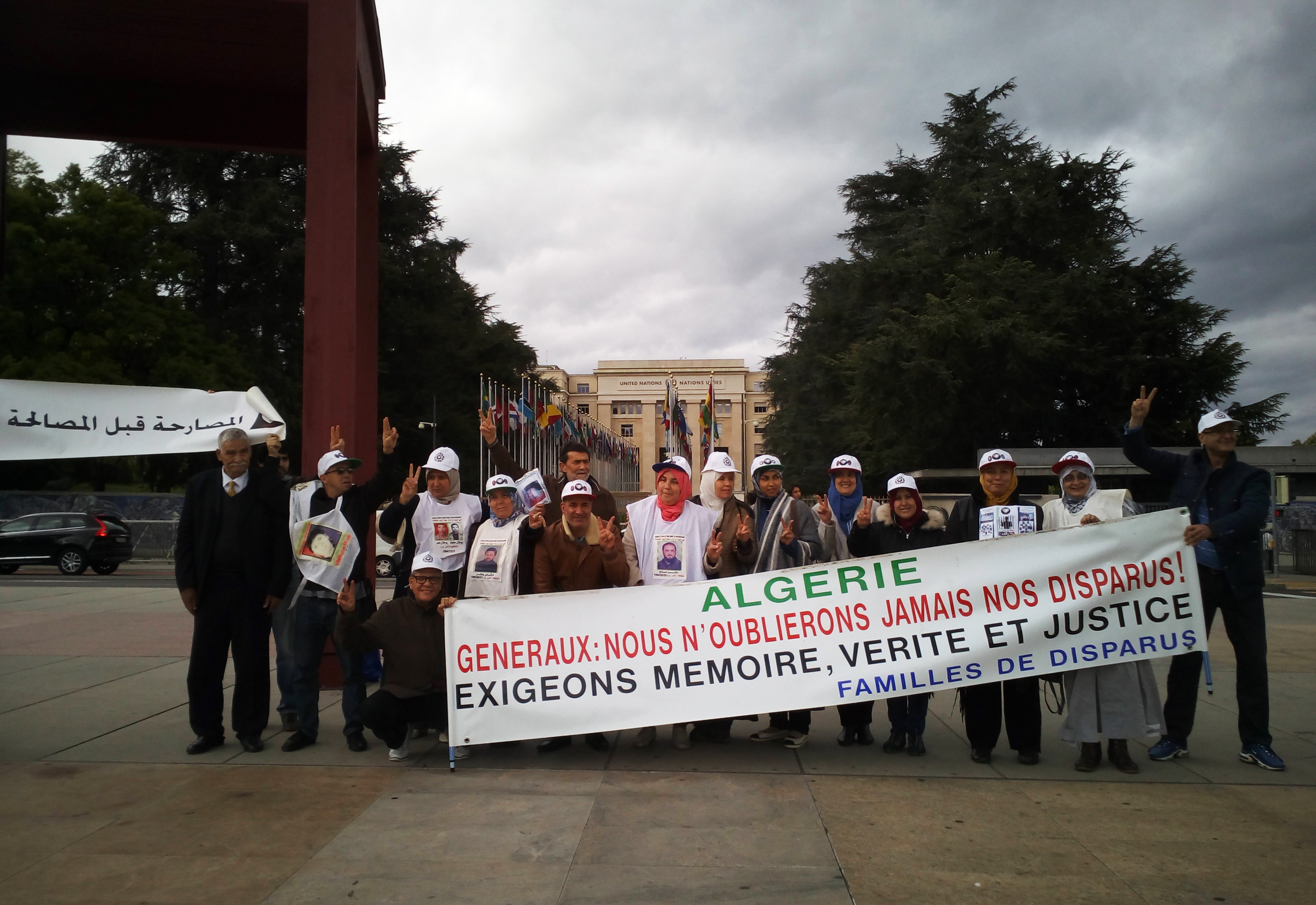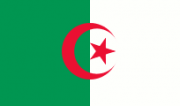
Families of the disappeared, Geneva, May 2017 (Source: Alkarama)

ALGERIA
 Our Concerns
Our Concerns
- Denial of the right to truth and justice of families of the disappeared, and continuous refusal to implement the decisions of the Treaty Bodies and to cooperate with the UN Working Group on Enforced or Involuntary Disappearances;
- Undue restrictions on the rights to freedom of expression, peaceful assembly and association and ongoing ban on demonstrations in Algiers;
 Upcoming
Upcoming
- July 2018: Review of Algeria by the Human Rights Committee.
On May 4, 2017, Algeria held its parliamentary elections, which were marked by a record low voter turnout, with only 30% of the electorate taking part in the elections, according to the authorities. This figure has been contested by the opposition and civil society members as being much higher than the real rate of participation. Local and international analysts stated that this lack of political engagement, which has been constant in the past decade, illustrates the extent of the population’s confidence crisis in its political leaders, and that it undermines the legitimacy of the current political system. The results of the elections, announced on May 6, 2017, gave a majority of seats to the ruling party, the National Liberation Front and its political ally, the Rally for National Democracy.
Furthermore, the authorities have failed to engage in sustainable legal, political, and economic reforms. Lower oil prices have restricted the government’s budget for public spending, seriously affecting the living standards of the population. As of the end of 2017, inflation has become rampant, leading to social upheavals as protests over the increasing costs of living have erupted in different parts of the country.
“The refusal of the authorities to shed light on the fate of the disappeared continues, in spite of several decisions from UN Treaty Bodies urging them to respect their international obligations by investigating these crimes and prosecuting perpetrators.”
Most of these social protests were met with violent dispersal by the security forces, illustrating the recurring violations of the rights and freedoms of Algerian civil society by the authorities. As the ban on demonstrations in the capital remained in place in 2017, the year was marked by arbitrary arrests of peaceful protesters, human rights defenders and bloggers who publicly expressed discontent and criticism against their government. This crackdown has affected critical voices from the families of victims of crimes committed by the security forces during the civil war who advocate for truth and justice, to youth activists and bloggers who denounce corruption and poor governance.

Persistent violations of the rights of families of the disappeared to seek truth and justice
ore than 25 years after the beginning of the civil war, thousands of families are still denied the right to know the truth about the fate of their relatives who disappeared after their abductions by the security forces in the 1990s. Algeria has the world’s fifth highest rate of cases pending before the UN Working Group on Enforced or Involuntary Disappearances (WGEID), and the visit requested by UN experts in 2000 has continuously been postponed by the government.
The refusal of the authorities to shed light on the fate of the disappeared continues, in spite of several decisions from UN Treaty Bodies urging them to respect their international obligations by investigating these crimes and prosecuting perpetrators. In May 2017, several families of disappeared persons travelled to Geneva to meet with the WGEID. The families shared their testimonies, raising issues such as the refusal of the authorities to implement UN decisions demanding the respect of their rights, as well as the social stigma and reprisals they face. They also raised the issue of the psychological suffering of entire families and the marginalisation of children of victims in public employment. They requested that the UN group of experts take a strong stance to denounce the lack of cooperation of the Algerian authorities as well as the reprisals they face.
Furthermore, ahead of the 2018 review of Algeria by the Human Rights Committee (HR Committee), Alkarama submitted its contribution to the Committee’s List of Issues on July 24, 2017. In its report, Alkarama raised 51 questions relating to a wide range of topics, including the lack of willingness of the authorities to investigate past crimes, and expressed concern over the 2006 Charter for Peace and National Reconciliation which enshrined in domestic law a blanket amnesty for state and state-affiliated forces for all crimes committed during the civil war. The Charter also constitutes an obstacle to the investigation of crimes committed during the war by non-state actors and to the prosecution of perpetrators.
Lastly, during Algeria’s third Universal Periodic Review, which took place on May 8, 2017, several UN Member States noted the absence of progress in the establishment of truth and justice for families of the disappeared, and recommended that Algeria accede to the International Convention for the Protection of All Persons from Enforced Disappearance, cooperate with the Human Rights Committee and fully implement its decisions, and that it send, without undue delay, a standing invitation to the WGEID for a country visit.

Violations of rights to freedom of expression, association and peaceful assembly
In 2017, violations to fundamental rights including freedom of expression, association and peaceful assembly continued to be reported. Such violations took various forms, including the persistent ban on demonstrations in Algiers as well as the violent crackdown against peaceful demonstrators. As a result, peaceful protesters defying the ban on demonstrations in the capital are systematically supressed, as illustrated by the dispersal of demonstrations in Algiers against the recognition of Jerusalem as the capital of Israel by the United States in December 2017. In other parts of the country where the ban is not enshrined in law, protests continue to be violently dispersed, including those that erupted over social demands in the eastern part of the country in December.
During the Universal Periodic Review in May 2017, numerous UN Member States expressed concerns over the limitations to freedoms of expression, association and peaceful assembly. In particular, a large majority of states called on the authorities to abolish all prison sentences for press-related offences, to decriminalise defamation and to adopt a framework to protect journalists from intimidation and harassment. In fact, the Criminal Code still imposes heavy fines on every person who causes offence to the president, including any “offensive, insulting or defamatory expression, through writings, drawings or discourse”.
“In 2017, violations to fundamental rights including freedom of expression, association and peaceful assembly continued to be reported.”
With regards to freedom of association, states called on Algeria to lift all restrictions on the registration of associations to make procedures more flexible and to ensure a safe working environment. They further encouraged the authorities to reform the 2012 Association Law to provide a clear and unambiguous legal foundation for the work of civil society organisations as well as to refrain from hampering the legitimate work of NGOs and human rights defenders. In fact, the executive still holds discretionary power to refuse the registration of associations under the pretext of non-compliance with “national values, public order, public decency and the provisions of existing legislation”. However, these recommendations to lift undue restriction on freedom of peaceful assembly, association and expression were rejected by the Algerian authorities who argued that such “violations did not exist” or were “justified by security concerns”.

Reprisals against the son of a victim of summary execution following a decision by the Human Rights Committee
n 2017, Alkarama raised the case of Rafik Belamrania with the HR Committee as well as with the UN Secretary General. Belamrania, a human rights defender and co-founder of the Mish’al association advocating on behalf of children of victims of enforced disappearance, has been the victim of continuous reprisals by the Algerian authorities.
In May 2012, after being unable to claim his right to truth and justice at the domestic level, he submitted a complaint to the HR Committee on the abduction and extrajudicial execution of his father, Mohammed Belamrania, who was arrested in 1995, tortured and executed by members of the Algerian army.
In late 2016, the HR Committee adopted its decision on the case, finding that the Algerian authorities had subjected Mohammed Belamrania to torture and extrajudicial execution and his family to cruel treatment. The UN experts therefore requested that the authorities fully investigate his execution, inform his family of the investigation and prosecute the perpetrators.
However, instead of implementing the decisions of the Committee, on February 17, 2017, two weeks after the decision was transmitted to the Algerian authorities, Rafik Belamrania was summoned to the Central Security Police Station of the Jijel wilaya. He was interrogated about his publications on Facebook, interrogated over his complaint to the Committee and his activism with Mish’al. He was subsequently placed in custody and a search was carried out at his home, resulting in the seizing of all the documents related to the Mish’al association as well as to the complaint he filed with the UN Committee.
Belamrania was subsequently charged with “supporting terrorism” by the Public Prosecutor of the Jijel Court under article 87 bis (4) of the Penal Code, establishing an alarming precedent in which the authorities equated the recourse to the UN human rights mechanisms to a form of “terrorism”. Upon Alkarama’s request, on March 31, 2017, a group of UN experts sent an urgent letter to the Algerian authorities expressing their great concern about these acts of intimidation, and denouncing the fact that Belmrania’s detention and the charges held against him were “related to his legitimate and peaceful activities in defending human rights and in particular his right to freedom of expression”. In addition, in September 2017, UN Secretary-General Antonio Guterres raised the case of Rafik Belamrania in his annual report on reprisals against those who collaborate with the UN.
On November 15, 2017, Belamrania was sentenced to five years imprisonment by the Jijel Criminal Court for “supporting terrorism” despite the absence of any material evidence. He was also sentenced to a fine of 100,000 Algerian dinars and three years’ deprivation of his civil and political rights, which entails that he cannot be a member of any association nor can he take part in human rights activism. During the hearing, Belamrania was asked to explain the files of victims of enforced disappearances seized by the police, and accused of “holding a grudge against the state”, thus underscoring the politicised nature of his condemnation.